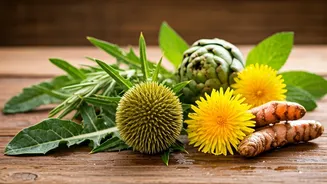Turmeric's Golden Touch
Turmeric, a vibrant spice commonly found in Indian kitchens, is well-known for its potent anti-inflammatory properties. The active compound in turmeric,
curcumin, has demonstrated an ability to reduce inflammation and oxidative stress, both of which are significant factors in the development and progression of fatty liver disease. Research suggests that curcumin may also enhance the liver's detoxification processes, aiding in the removal of harmful substances. To gain these potential benefits, turmeric can be incorporated into your diet in various ways. You can add it to curries, smoothies, or even take it as a supplement, ensuring that you're getting a sufficient dose for potential therapeutic effects. Adding black pepper can increase its absorption, further boosting its effectiveness.
Milk Thistle's Support
Milk thistle is another powerful herbal ally for liver health, largely due to its main active constituent, silymarin. Silymarin acts as an antioxidant and anti-inflammatory agent, actively protecting the liver from damage caused by toxins, including alcohol and certain medications. Studies indicate that milk thistle can promote the regeneration of liver cells, which is beneficial for those with fatty liver disease. It achieves this by stabilizing liver cell membranes and promoting protein synthesis. Milk thistle is often available as a supplement, making it easy to integrate into your daily routine. However, consulting with a healthcare professional before starting any new supplement regimen is always recommended, especially if you have underlying health conditions or are taking other medications.
Ginger's Digestive Aid
Ginger, a spice celebrated for its digestive benefits, can also positively affect liver health. It has demonstrated the ability to reduce inflammation and oxidative stress, which are crucial in managing fatty liver disease. Ginger's antioxidant properties help shield the liver from damage caused by free radicals. Additionally, ginger can improve liver function by enhancing bile production and flow, thereby assisting the body in the digestion of fats. The versatility of ginger means it can be consumed in numerous ways, from fresh ginger tea and adding it to culinary dishes, to taking it as a supplement. Including ginger in your daily routine might provide multifaceted benefits for both your digestive and liver health.
Garlic's Liver Boost
Garlic, a common kitchen staple, is packed with beneficial compounds that support liver health. Garlic's high sulfur content aids the liver in detoxification processes, helping it eliminate harmful substances from the body. Studies have indicated that garlic can reduce liver fat accumulation and improve liver enzyme levels in individuals with non-alcoholic fatty liver disease. Moreover, garlic acts as an antioxidant, safeguarding liver cells from damage. Incorporating garlic into your diet is simple: use it in cooking, add it to sauces, or even consume it raw. Its potent properties make it a valuable addition for promoting overall liver wellness.
Artichoke's Liver Cleanse
Artichoke extract is known for its ability to improve liver function. Artichoke contains compounds such as cynarin, which stimulate bile production, aiding in the removal of toxins and supporting the liver's detoxification pathways. This herb is also rich in antioxidants, offering protection against liver cell damage caused by oxidative stress. Furthermore, artichoke may help to reduce cholesterol levels, which can be beneficial for those with fatty liver disease. You can consume artichokes as part of your diet, or take artichoke extract supplements to potentially enhance their benefits. Its dual action of cleansing and protecting makes artichoke a beneficial addition to your health regimen.
Dandelion's Detox Power
Dandelion, often regarded as a weed, possesses potent benefits for liver health. It functions as a natural diuretic, assisting the liver in removing waste and toxins from the body. Dandelion also stimulates bile production, which promotes efficient digestion and detoxification. Moreover, dandelion is rich in antioxidants that protect liver cells from damage. It can be consumed in various forms, including dandelion tea and dandelion root supplements. Regular consumption of dandelion can help boost your liver's natural detoxification processes, improving overall liver function and promoting wellness.
Green Tea's Antioxidants
Green tea is packed with antioxidants, most notably catechins, which are extremely beneficial for liver health. These antioxidants help reduce inflammation and protect the liver from oxidative damage caused by free radicals. Studies indicate that green tea can improve liver enzyme levels and decrease fat accumulation in the liver, making it a valuable addition to your diet. Drinking green tea regularly can offer a straightforward way to protect and support liver function. The antioxidants within green tea work synergistically to provide a shield against various threats to liver health. Consuming green tea can be an easy and pleasant way to enhance your overall liver health and well-being.
Rosemary's Protection
Rosemary, frequently used as a culinary herb, also offers benefits to the liver. It has antioxidant and anti-inflammatory properties, providing protection against liver cell damage. Rosemary can stimulate bile production, which supports the liver in its detoxification processes. It contains compounds that may help reduce liver fat and improve liver function. Adding rosemary to your food is a simple way to incorporate its benefits. Whether used fresh or dried, rosemary can enhance the taste of your meals while offering liver-protecting properties. Regularly including rosemary can contribute to better liver health and overall well-being.
Peppermint's Digestive Aid
Peppermint is known to have properties that aid digestion and can also be beneficial for liver health. It helps improve bile flow, assisting the liver in its detoxification processes and enhancing overall liver function. Peppermint also has anti-inflammatory properties, which can help reduce damage and inflammation in the liver. Consuming peppermint tea or using peppermint essential oil can provide relief from digestive issues while also supporting the liver. The calming properties of peppermint can assist with stress management, which can indirectly benefit liver health. Enjoying peppermint in various forms can contribute to both digestive comfort and liver wellness.
Licorice Root's Benefits
Licorice root, traditionally used in herbal medicine, has properties that could offer benefits to liver health. It contains compounds with anti-inflammatory and antioxidant effects, helping to protect liver cells from damage. Licorice root can also assist in promoting liver detoxification processes, aiding the liver in clearing out harmful substances. Furthermore, it might have antiviral properties that protect the liver from viral infections. Licorice root is often consumed in tea or as a supplement, however, it is important to use it with caution and under professional supervision, especially due to its potential impact on blood pressure and other medications. Adding licorice root to your routine can potentially contribute to your liver’s overall well-being.

















